
Racist Violence Has Shattered The Myth That Asian People Can Be Invisible In America
Jason Wang already had plenty of problems from the pandemic. He’d closed several locations of his family’s popular Chinese restaurant chain, Xi’an Famous Foods, laid off staff, and been trying to think of new sources of revenue when no one in New York was dining out — before his employees started getting punched in the face.
One of the workers was a man who was attacked coming to work, leaving him with broken glasses and a swollen face. The other was a woman, on her way home, who suffered a cut lip and bruised nose. “They were just traumatized,” Wang said. “These attacks are happening in broad daylight.”
Wang and I spoke the morning after a Malaysian man was randomly beaten in an attack outside a subway station. Wang said he had started shopping for bulletproof apparel. Would he need protection against a 9 mm bullet or a .44 Magnum, or perhaps even a rifle shot, he wondered. “Hopefully no one’s aiming at me with a rifle,” he said. Two weeks after we spoke, six Asian women were shot dead in Atlanta.
Like Wang, many Asian Americans are grappling with heightened anxiety about their personal safety and the bleak sense that no matter how many people are punched, shoved, knifed, hospitalized, and even killed, people continue to question whether a wave of hate crimes is really happening. There’s been a silent history of violence against Asian Americans for generations — including my own family. The pandemic and former president Donald Trump’s racist rhetoric about the “kung flu” have unbottled anti-Chinese sentiment that marks the latest chapter of racism against Asian people in America. A steady drumbeat of reports of harassment and attacks over the past 12 months has forced communities of people who have traditionally kept their heads down and tried to quietly trudge forward to realize that keeping a low profile is not enough to ward off hate.
“We’ve been taught our entire life to just fit in,” Rep. Grace Meng said at a rally against anti-Asian hate in Manhattan last month. “Just be quiet. Don’t speak up. Be invisible; if you are invisible enough, you will be seen as American. But we are saying that we will be invisible no more.”
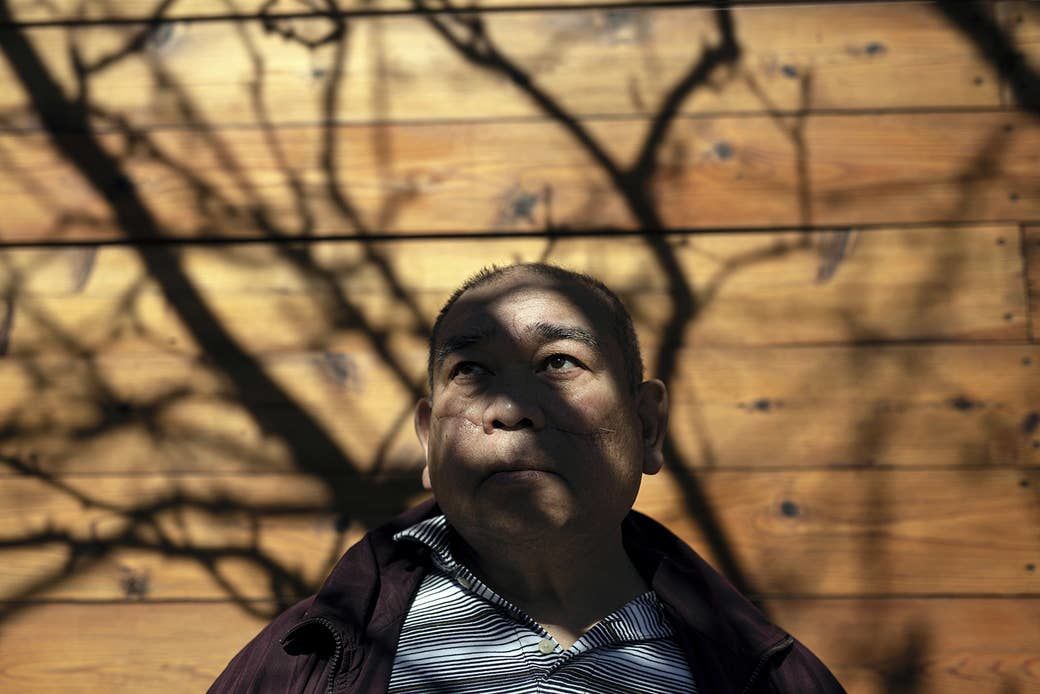 Noel Quintana, who was slashed in the face in a random attack while riding the subway.
Noel Quintana, who was slashed in the face in a random attack while riding the subway.
Meng’s call for action came less than 48 hours after another Chinese man had been stabbed in the back with an 8-inch knife in an unprovoked attack on the border of Chinatown. The suspect in the stabbing turned himself in and said coldly, “If he dies, he dies. I don’t give a fuck.” Ralliers cried for justice.
When Noel Quintana stepped up to the mic, the crowd quieted down. Quintana, 61, was easy to recognize: His face had been sliced open with a box cutter on his way to work one morning a few weeks earlier, and the wound — which rips across from the far end of one cheek, under his nose, to the opposite end of the other cheek — was still fresh. Quintana hasn’t been able to sleep, he later told me. When he goes to bed each night, his mind can’t seem to get to that fleeting moment of peace that allows a person to submit to rest.
The attack happened on Wednesday, Feb. 3, nearly a year into the wave of violence. Quintana, an immigrant from the Philippines, was in a hurry since his coworker wasn’t able to go in that day. Headed to his job at a nonprofit in Harlem, he hopped on an L train crowded enough that there were no seats left and stood at the door. A young man approached Quintana and suddenly started kicking his bag. He moved it, but within a few minutes the man began kicking his bag again. “What’s wrong with you?” Quintana asked as he moved away. And that’s when the young man quit kicking the bag so that he could slash Quintana’s face with a blade.
Quintana doesn’t know for sure if his attacker was motivated by racism; he didn’t say anything explicitly racist. But as far as Quintana can tell, he was the only Asian person in the train car that morning. “My eyes can’t deny it,” he said.
Nearby passengers gasped. “When I put my hands on my face, it was so bloody,” he said. “I asked for help, but nobody helped me.” No one alerted the conductor, or called 911, or used their phone to take a video. “Nobody even said, ‘How are you?’” So Quintana exited the train, fearful he would die from the loss of blood, which was soaking his shirt and dripping over his pants and shoes, and stumbled to the station booth, looking for anyone willing to help so he wouldn’t have to live this nightmare by himself. “Was it because they don’t want to be delayed for work? Was it that they don’t care? I couldn’t grasp what happened to people during the time,” he told me.
The cops came, then an ambulance. He stayed at the hospital overnight. When Quintana returned to the hospital two days later to remove his stitches, he suffered an anxiety attack that left him unable to breathe and his body numb. He spent 24 hours in the ER for observation.
By the end of February, people around the country had reported nearly 3,800 firsthand accounts of verbal and physical harassment against Asians (including in the workplace) since the start of the pandemic to Stop AAPI Hate, a group that formed last year to track incidents and advocate for human rights protections. Another study of police data found that hate crimes targeting Asian people more than doubled in 2020. The attackers had been Black, Latinx, and white.
A growing cry from Asian communities to label incidents like Quintana’s as “hate” has less to do with whether an incident is prosecuted as a hate crime and everything to do with asking American society — people, government, media, advocates — to acknowledge that Asian people are being hurt by hate and racism, and to do something about it. Quintana told me he is fine with the fact that there is no hate crime charge in his legal case because of the difficulties in proving bias, but he does believe his attack was an act of hate and that people were indifferent to it as it unfolded.
It’s hard in a situation like this not to feel utterly invisible in the absence of help, which is a painfully familiar sentiment to many Asian Americans who feel few people really give a fuck about the racism we’ve experienced, both during the pandemic and long before that. Perhaps it’s because there are people who don’t really believe that Asian people are targeted for their race. People who believe the model minority myth that claims Asian people are a monolith that overcame discrimination. Or maybe there are just too many people who refuse to help an Asian person.
When Rep. Meng introduced a symbolic resolution last year asking “public officials to condemn and denounce anti-Asian sentiment, racism, discrimination, and religious intolerance related to COVID-19,” 164 Republicans voted against it.
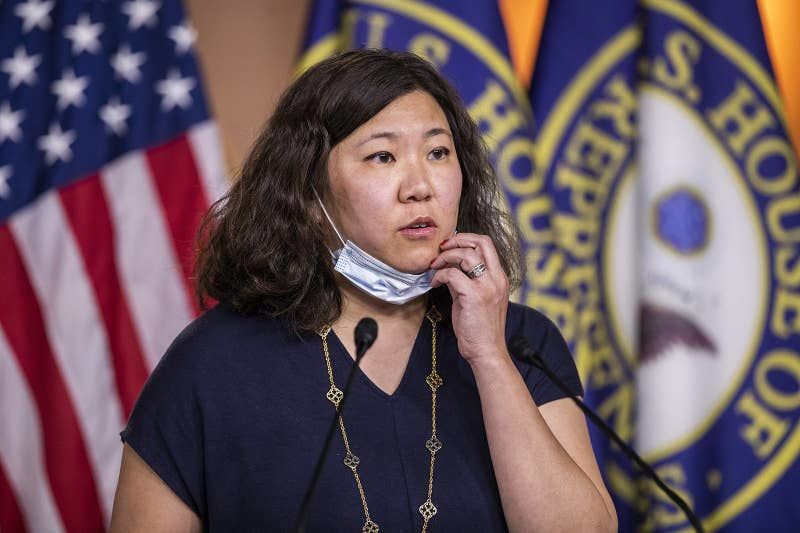 Rep. Grace Meng speaks at a news conference on Capitol Hill on Wednesday, May 27, 2020.
Rep. Grace Meng speaks at a news conference on Capitol Hill on Wednesday, May 27, 2020.
After a white man killed eight people, including six Asian women (four were Korean), in Atlanta-area spas on March 16, law enforcement told reporters the suspect gave no indicators that these attacks were racially motivated and suggested instead that the suspect had a sex addiction, as if to rule out the possibility that someone who killed six Asians was racist by alluding to a racist stereotype of Asian women. Maybe some will always wonder if the shooter noticed he was killing Asian women at a business called Young’s Asian Massage.
When it comes to anti-Asian racism, skeptics have demanded a greater burden of proof. It’s as if people are saying: There must be some other explanation — let’s calm down and not add fuel to the flames. Skeptics caution that victims and advocates are too quick to suggest these incidents are racially motivated. When police killed 19-year-old Chinese American Christian Hall on a highway in Pennsylvania, people could only wonder whether race had anything to do with his death. Skeptics challenge the severity of anti-Asian racism and get tangled in the legalities of what defines a “hate crime” when people are being violently attacked, unprovoked. They say firsthand accounts of harassment are unreliable. I don’t understand how people still hold on to the idea, after the unbelievable year we just went through, that racism only exists when there’s an explicit verbalization of it. It’s in the atmosphere. This reluctance to recognize how pervasive anti-Asian racism is has only allowed this strain of race-fueled hate to fester. If these skeptics adjusted their focus ever so slightly, I thought, it would be clear to them too.
“I think the lack of understanding, the lack of seeing it as an issue, is really just because it’s so normalized,” Jason Wang said. “Everyone thought it was almost a joke that Chinese people would feel racism.” Only now — after the pandemic and the thousands of reported incidents of anti-Asian harassment this year, after the light the Black Lives Matter movement has shined on racism — does Wang feel experiences like his have a chance of being taken seriously.
In instances when the assailants have been Black, some people — including Asians, including advocates, including even victims — have been wary about stoking anti-Black racism by calling attention to the attackers. From the moment Asian people arrived in America, they have tried to assimilate into a system in which Black people are oppressed. In the competition for American opportunities, debates over education inequities, police enforcement, and community preservation have often pitted Asian and Black people on opposite sides. During the 1992 LA riots, 2,300 Korean-owned businesses were looted or burned down after a Korean convenience store owner fatally shot a Black teen. In a country where racism is often discussed in binaries, many in Asian diasporas are unsure how they fit in, rendering them silent and making this wave of racist violence hard to process.
I hope things change. At the rally in Manhattan last month, I saw Black and Asian attendees pursuing a way forward that focuses communities on supporting each other in the broad commitment to anti-racism.
As I watched the protesters shout for justice and for some modicum of recognition of this struggle, I couldn’t help but feel angry at people who try to repress our pain by asking us to silently, internally litigate whether or not a crime is truly hateful — to minimize the scope of the problem by recasting this wave of attacks during the pandemic as a mere collection of single, random incidents with no common thread except that the victims were all Asian and the attackers were not. How do you tell people to efface their pain, that their most valuable contribution to this moment is to swallow their fear? Asking victims and their advocates not to say “hate crime” feels to me like a reincarnation of the insult thrown at Asian people over and over again in this country: “Learn English.”
It’s a message I’ve internalized so deeply that while writing this story, I considered referring to all the Asian people I spoke to by their first names through the piece — names that may be easier for English speakers to pronounce, like Jason and Noel — rather than by their last names, as is the convention in news reports. Would that make it easier to follow along, to digest what people are saying, if they are identified by Western first names rather than Asian last names? Will Asian names subtly distract a reader? They might. But in the end, I couldn’t bring myself to deracialize something so core to identity as a name, mainly out of respect. We learned English, but we can’t obscure our heritage.
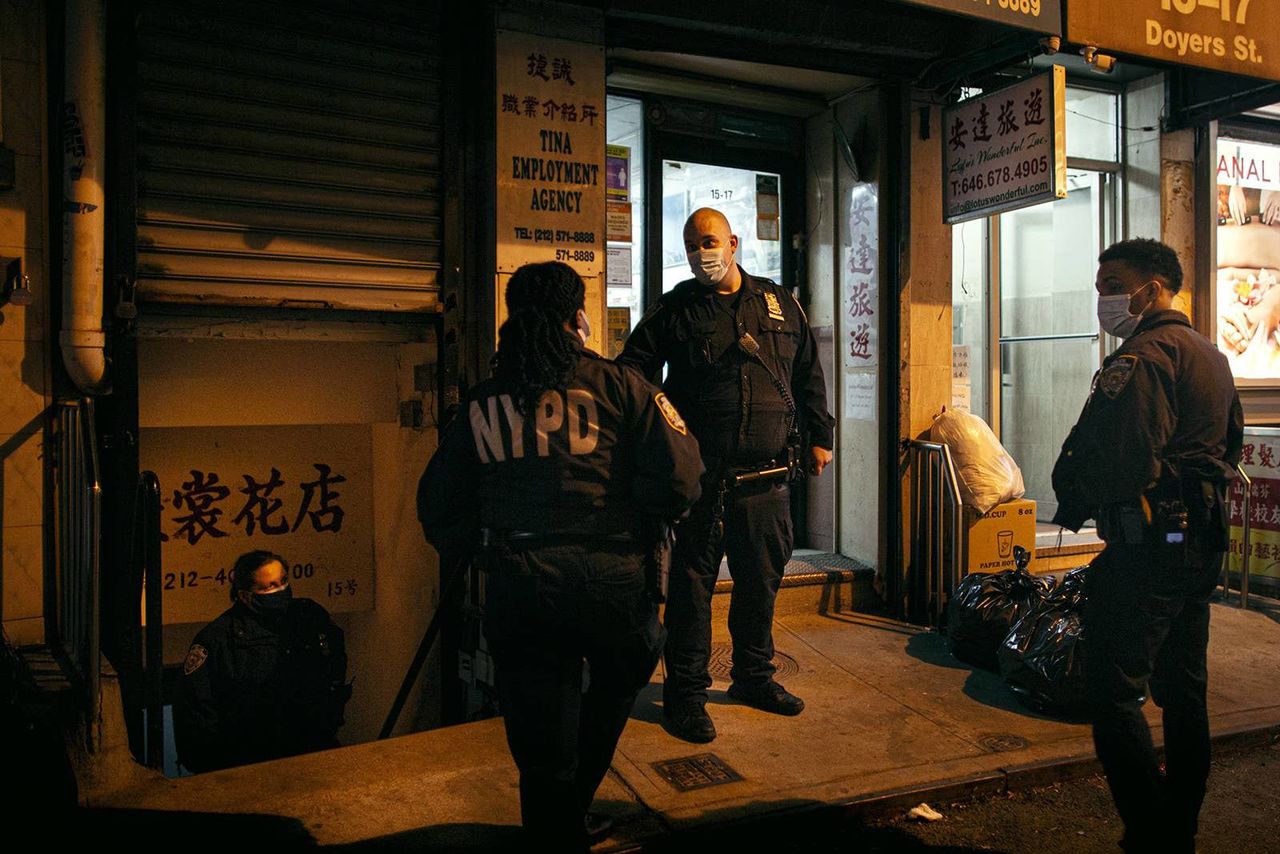 Police respond to a call in Manhattan’s Chinatown.
Police respond to a call in Manhattan’s Chinatown.
I had arrived at the rally in Manhattan that afternoon with a stash of masks and hand sanitizer and a dull fear that something violent would happen. I was there as a reporter, but acutely aware that, as a second-generation Chinese American raising children of my own, I also had a direct stake in the issue at hand: the safety of Asian communities. I asked participants who were Asian like me why they were there: “It’s disturbing,” one person said. Another felt she had to do something besides posting on social media. One man said he felt targeted. In some way, we were all there for the same reasons, and grappling with the same stew of distressing emotions.
When I met Winton Tran at the rally, he said he had been unable to sleep. He recalled a time last year when he was on the subway when someone said, “Go back to your country! Go back to China!” Tran tried to make a video of his harasser, but the man blocked his face. When he called the police, he got more questions than support. “It’s sad that people don’t pay attention until you get killed, not when you’re being harassed.” As a result, Tran said, “I’m fearful for my community. I’m fearful for friends.” Even though we had just met, he said he is even fearful for me. “I’ve connected with you, Venessa, the reporter. And I would hate to wake up one day to hear the news that this reporter got attacked, or something happened to her because I didn’t try to do something.”
Tran is running for City Council to represent a diverse district in Brooklyn that includes large Asian communities. “I need to do my part,” he said. “Nobody is listening to you.”
I think I understand what Tran means. I have a recurring nightmare that I am screaming in a panic — it’s not always clear why — but I can’t get any sound out, no matter how hard I strain or how wide I open my open mouth. And because no one sees how terrified I am, I am terrified alone. It’s just a dream. But I can’t help but wonder now if anyone would help me if I one day found a box cutter on my face too.
Brooklyn resident Melissa Liu told me about an incident in the laundromat when an unmasked person came up and said, “You’re avoiding us as if we gave you the virus, but you’re actually the one who gave it to all us.” No one intervened. Liu stepped outside to de-escalate the situation, worried it would turn into physical violence. But it’s no longer clear where Liu would feel comfortable doing something as mundane as laundry. People have been harassed or worse while doing daily chores, commuting, working — simply being out in public.
This terror is one that Asian people have largely borne alone, on top of all the other terrors that have engulfed the country since 2020. And in a year when the national outcry over racism finally rang clear, many feel the media has been quick to move on from anger erupting in Asian communities, reducing it to isolated flashes of outrage.
A bevy of elected officials, including Mayor Bill de Blasio and Attorney General Letitia James, showed up at the rally to express support. “Rise up! Rise up! Rise up!” the crowd chanted with Sen. Chuck Schumer.
Was this just another flash of outrage?
When I looked over this crowd of people who were moved enough to come out to support Asian communities on a damp winter day in the middle of a pandemic, I felt a rare moment of strength after a year of feeling completely powerless. It wasn’t the largest protest by any stretch, but it was a hopeful sign.
It’s why Noel Quintana wanted to tell his story. “I can’t do anything about my face anymore,” he told me. “But at least now I can still contribute to the safety of other Asians, Asian Americans, not only here in New York but around the country and probably around the world.”
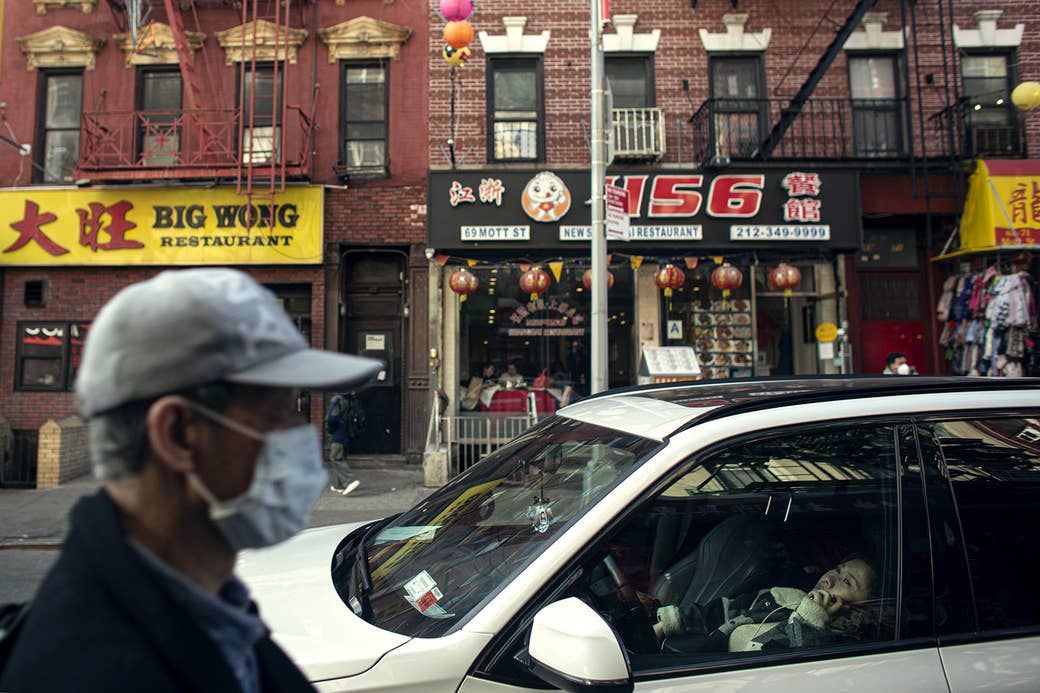 Chinatown, New York, March 2021.
Chinatown, New York, March 2021.
Fear and a sense of being overlooked by both law enforcement and bystanders is galvanizing Asian Americans to mobilize in different ways. Some Asian Americans are purchasing guns for the first time, with no training on how to use them. One person commented on social media, “We citizens need guns of our own as cops don’t care.” It’s hard not to wonder what could go wrong from here.
Various volunteer block watches have also sprung up in response to the violence. Karlin Chan formed the Chinatown Block Watch in New York last year, when incidents of harassment were being reported. He’s helped to diffuse a few incidents of verbal harassment, through which he realized a sad truth about the assailants. “They realize that you speak English, and they back down,” he said. “Most of these people are cowards, and they pick on the vulnerable.”
What’s become clear during the pandemic is how, untreated, the sentiment that underlies the quieter, more mundane expressions of racism can evolve into physical violence.
Esther Pang, the board chair of Hollaback, an organization that aims to “end harassment — in all its forms,” launched a bystander intervention training on anti-Asian harassment that has been attended by 15,000 people so far. “A huge part of it,” Pang explained, is “talking about how contextually speaking, historically speaking, the disrespect and harassment against Asian Americans have always been there.” To help people recognize it better, the organization describes harassment on a “spectrum of disrespect” ranging from not listening and favoritism on one end to humiliating jokes to verbal and physical assault on the other end. “People might not think much about microaggressions, but...it can progress from one thing to another.”
What Pang finds “heartbreaking” about Noel Quintana’s experience is that no one acknowledged it while it was happening. “And I think acknowledgment is a way to reduce part of the trauma,” Pang said.
None of this was something Quintana thought he’d have to deal with when he arrived in Los Angeles from the Philippines at age 47 to get his master’s degree in international business. He had a good job in the Philippines as an accounting manager, he said, but the work was stressful and a colleague in Florida convinced him to give the United States a shot. It wasn’t easy. He didn’t have a car in LA so it was hard to have much of a life, he said. Quintana would walk back home at night, since his classes ended after the last bus home departed. “Sometimes I was the only one walking in the streets and I would scream, ‘Ahhhhhh!’ What did I do with myself?” He moved to New York when the economy was in the pits of the Great Recession and found part-time work as a barista. He’d read articles about laid-off bankers who found themselves in similar jobs and appreciated finding a new life that was less toxic. “I liked it, and there was no more pressure,” he said. “Especially during Christmas, when you’re preparing coffee, and it smells like coffee as it’s snowing outside. It feels so relaxing.”
That was long ago. Thinking back on his decision to move to the United States, Quintana said, “I don’t think I have any regrets.” And in spite of the scar he now carries from living in a country that is violent to so many, when Quintana thinks of the American dream, “the pursuit of happiness, justice, and equality,” he said, “I still believe in it.”
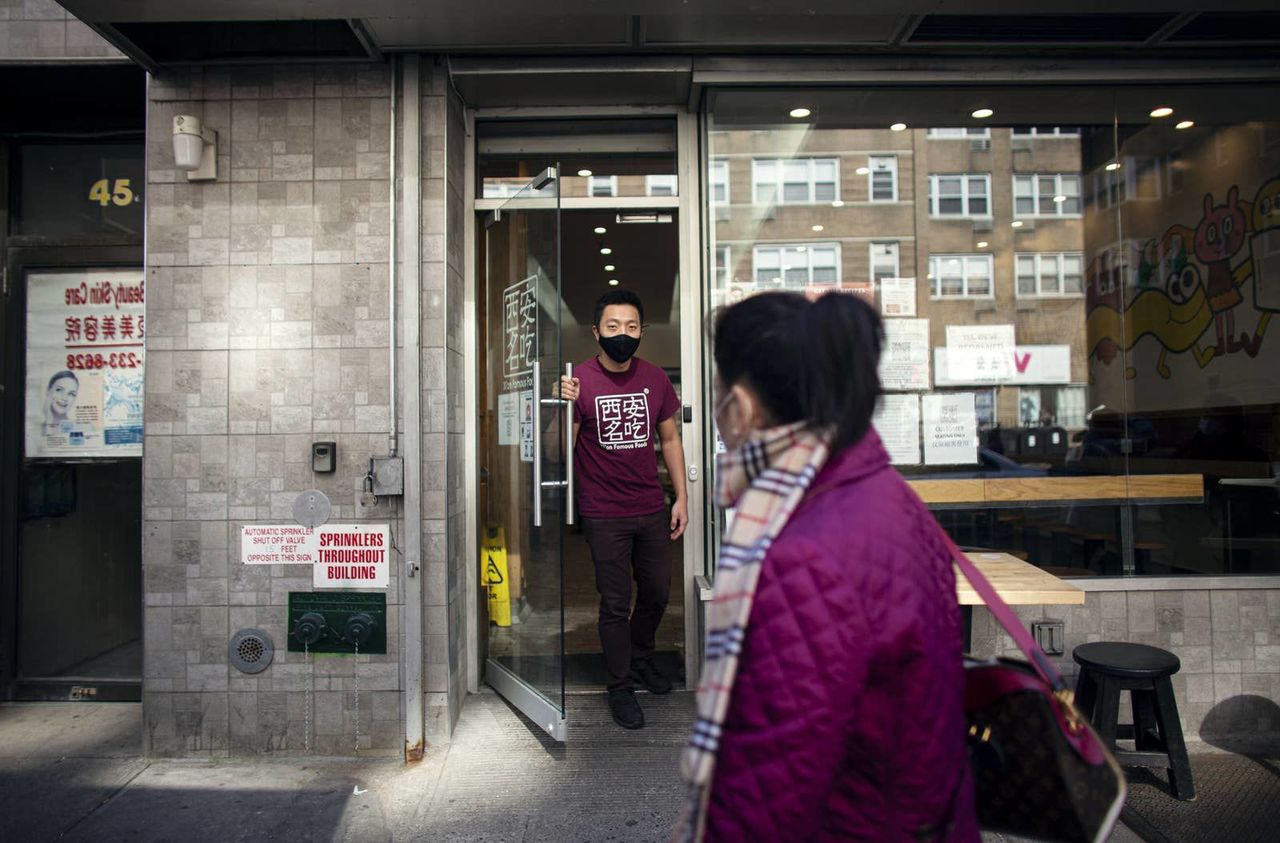 Jason Wang at Xi’an Famous Foods in Manhattan’s Chinatown, March 9, 2021.
Jason Wang at Xi’an Famous Foods in Manhattan’s Chinatown, March 9, 2021.
Before Jason Wang’s family started Xi’an Famous Foods, in 2005, they were in Xi’an, China (pronounced shee-ahn). Wang lived in Michigan and Connecticut and went to college in St. Louis before settling down in New York, and he described daily racism as “a given” growing up as the only Asian person in some small towns. Even though 22.3 million Asian people make up more than 6% of the US population, in at least 40% of US counties, fewer than 1% of residents are Asian, according to estimates from the Census Bureau’s American Community Survey.
“I was punched in the chest. I was pushed against the lockers. I was in fights because they were making fun of the food I was having. All these things happened,” said Wang, now 33. Trump’s rhetoric may have worsened anti-Chinese sentiment, but it was already “everyday life” well before 2016, he said.
Anti-Asian racism is deeply rooted in American history. Discriminatory laws restricted Asian immigration, excluded Asians from citizenship, land ownership, and employment in most industries, and prohibited them from marrying white people. Ordinances outlawed Chinese hairstyles and methods of carrying groceries. In San Francisco in the 1870s, Chinese people were regularly robbed and beaten to the point that they had no residential option outside of Chinatown. In LA in 1871, a mob lynched 15 Chinese people and destroyed and looted homes, but the sentences of the eight convicted rioters were overturned on “legal technicalities,” according to Syracuse University law professor Mary Szto. By 1940, “only two residential districts in Los Angeles permitted ‘Orientals.’”
“Although today they may seem like quaint tourist attractions, Chinatowns arose because of discrimination,” Szto wrote.
My parents met 50 years ago in Manhattan’s Chinatown, a vibrant enclave where poor young Chinese singles could gather with people who shared their particular joys and struggles, away from judgment. It offered a haven not only for safety, but culture as well.
My family, like so many, worked for low wages in laundries and restaurants when they arrived in the 20th century because that was the work Chinese people were allowed to do in America. It took generations living in poverty or on the edge of it here for my family to establish itself, so that eventually I could grow up in a middle-class household in the outskirts of Brooklyn with the privilege of agonizing over what I wanted to be when I grew up.
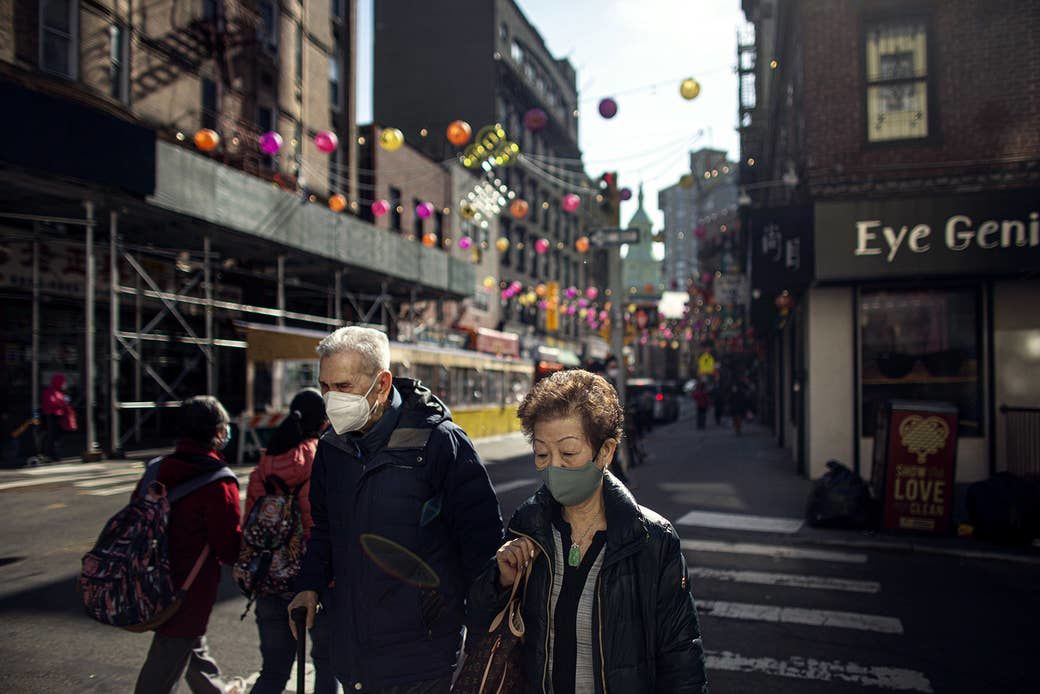 Chinatown, New York, March 2021.
Chinatown, New York, March 2021.
I cringe when I remember the time my former boss’s friend told me the most surprising thing about living in China was realizing that Chinese people don’t all look alike, and I just quietly listened in a state of shock. Ask any Asian American about how they’ve experienced racism and you’re almost guaranteed to hear a story about racial slurs, eye-pulling, smelly lunch ridicule, mocking accents, and other manifestations of race-based bullying that we have sadly become accustomed to. Some people tell us Asian people are ugly; some say they simply don’t date Asians. We regularly get confused for another Asian person. Other times, it feels like being sidelined: that sense of being socially and professionally invisible that more Asian people have started talking about, dealing with the fact that people assume you have nothing to say when they never even bother to ask.
Even though I grew up in whiter neighborhoods, I regularly returned to Chinatown: My family’s culture — in all its dimensions — was central to this part of the biggest city in America, not marginalized to a few square feet of the “ethnic foods” aisle. I hope the neighborhood survives for my children too.
That food, which Asian kids have been mocked for in cafeterias across the country, would eventually be the foundation of Wang’s successful business, which was featured in Anthony Bourdain: No Reservations and lauded by critics, and grew to 14 locations. But then in February 2020, Wang watched sales at his restaurants begin to slump as news about the novel coronavirus made people worry about going out to eat. The Trump administration had just imposed travel restrictions on people who had been to China, where almost all of the 71,000 cases of COVID-19 had been reported by mid-month. Asian people around the world were reporting racist harassment related to the virus, and were berated with insults like “you dropped your coronavirus” and “diseased bitch.”
On March 11, 2020, the World Health Organization declared a pandemic. On March 13, Trump declared a national emergency to control what he’d soon call the “Chinese virus” and “kung flu.” (When CBS News White House correspondent Weijia Jiang asked why the president used these racist terms, former press secretary Kayleigh McEnany brushed off the concerns. He continued to deploy them throughout his term.)
On March 14, in Midland, Texas, Bawi Cung was in the meat aisle of a Sam’s Club with his children when he was punched in the back of his head. Then a knife ran across his face. The attacker ran off, only to return moments later to slash Cung’s 6-year-old son across his face and ear and wound his 2-year-old son’s back.
That same day, New York City confirmed its first death from COVID-19, shortly after declaring a state of emergency. Jason Wang closed down all 14 Xi’an Famous Foods locations. “I was just like, OK, well, if you don’t have a reason to go out, let’s just not go out,” he said. “Obviously, besides the virus, there’s also the hate virus, the attacks, so let’s just stay home. Let’s just be safe.”
One attack followed another.
In April 2020, a woman in Brooklyn suffered serious burns after someone poured acid on her.
An 89-year-old Brooklyn grandmother was set on fire by two teens in July.
That same month, a family dining out in Carmel Valley, California, was harassed by a tech CEO who unleashed a racist rant that included calling them “Asian pieces of shit.”
In August a woman, nearly 9 months pregnant, was punched in the face and called racial slurs in Philadelphia.
A California restaurant owner found the g-word graffitied across her business one morning in December.
This year, an 84-year-old Thai man in San Francisco died on Jan. 30 after his head hit the pavement when he was pushed.
In February, a 91-year-old man was shoved to the ground in Oakland’s Chinatown by an attacker who went on to push a 60-year-old and a 55-year-old to the ground, sending them to the hospital for their injuries.
A man in Rosemead, California, who was beaten with his own cane lost the tip of his finger.
A 52-year-old woman was knocked unconscious in Queens.
A US Air Force veteran was beaten in LA’s Koreatown.
“It just felt like these attacks were happening every day,” said Wang, who was watching this crisis unfold in his community as he dealt with his company’s own crisis.
Wang had started shipping chili oil and meal kits during the lockdown to generate some revenue, although it wasn’t nearly enough. When restrictions were lifted, he gradually reopened restaurants one by one, renegotiating deals with his landlords. By October, Wang had reopened eight locations, mostly as a labor of love — he lost $97,000 that month alone, mainly “because of the rent,” he said. The company received loans through emergency relief programs, but “at the rate that we’re burning through it, we ran out of that pretty quickly,” he said.
As the vaccine rolls out, Wang hopes things at Xi’an Famous Foods can turn around soon. Until then, Wang continues to evaluate line items as small as $100 to see if there’s any way to cut back even further. “It’s just really squeezing those pennies at these times,” he said.
He looks over his shoulder more than he used to when he walks around the streets of New York. “I feel like I need to be prepared,” he said. “And I feel like this is the new status quo of living.”
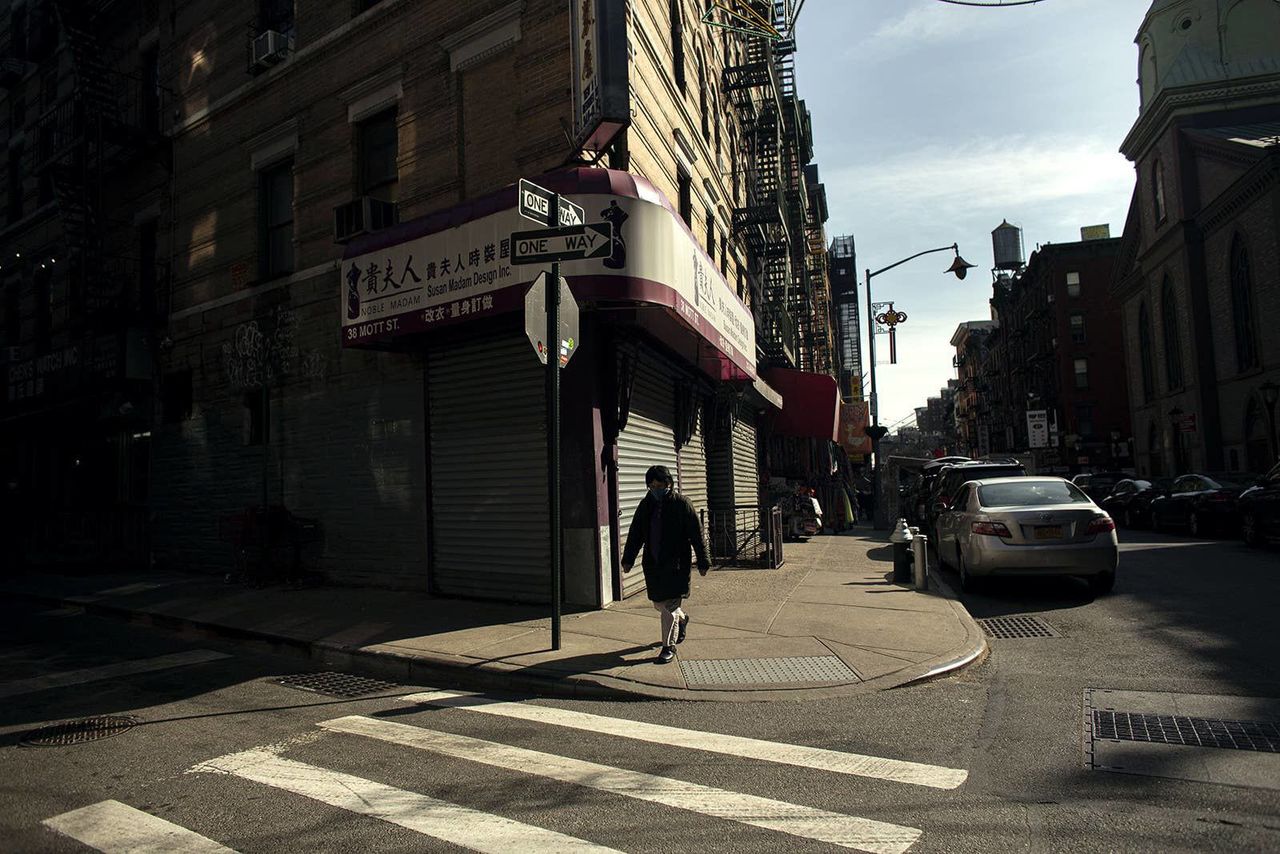 Chinatown, New York, March 2021.
Chinatown, New York, March 2021.
Several times a year, my family visits my great-great-grandfather’s grave, a small, cinder block–sized headstone up on a hill in a cemetery in Brooklyn, and I wonder what his life here was like. Recently, I’ve also wondered what he’d have to say about the attacks happening now, nearly a century after his death.
My family was in and out of the United States for years and treated like “second-class citizens” before they eventually settled here, I’ve been told. My great-great-grandfather died in New York decades before my mother was born on the other side of the world in China, and decades more before I would be born in the city where his life ended.
The story is that my great-great-grandfather died after falling onto the train tracks in New York City around the time of the Great Depression — my mother says he was pushed. That’s what my great-grandmother told her when she was a teen. The first time my mother told me about his death, I also was a teen, too young to fully understand why it might matter. I don’t know how his Chinese name was written in the alphabet, so I don’t know how to begin to research it. But a story like that sticks with you. I’ve wondered over the years if great-great-grandpa was shoved by a racist, if he was the victim of a hate crime. Were there bystanders who ignored him, like Noel Quintana? Did he think this was happening to him because he was Chinese? I’ll never know.
So many details about my family were lost in the migration, fallen through the cracks between generations, as it goes in many immigrant families. This is why it is important to me, and to so many other Asian people, to create a historical record of hate now. For so long, we’ve thought keeping our heads down, being invisible in America might help us gain acceptance — but racial invisibility is a myth. Not knowing whether these crimes were motivated by racism, trying to glaze over that possibility only preserves the myth of invisibility. And it makes it too easy to move on without making anything better. To know is to shatter that myth.
For my family, it’s too late. Still, this moment of tragedy in my family has transcended time, whispered in brief from one generation to the next, like a warning to always be careful.










